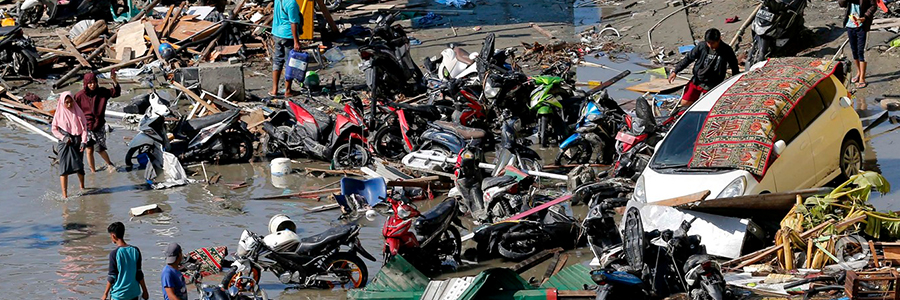As search and rescue operations begin to wind down in Central Sulawesi, following the September 28th earthquake and tsunami, the UN Migration Agency (IOM) is deploying staff and aid to the affected area at the request of the Indonesian authorities. Three IOM specialist staff, including a doctor, will take part in a multi-agency assessment mission in the affected area.
IOM will dispatch on October 6 an 11-truck convoy from Makassar in southern Sulawesi to Donggala, one of the worst affected towns in the area, carrying 83,600 liters of drinking water in 19-liter re-usable plastic bottles. The convoy, the first of six or seven scheduled over the coming days, will have a police escort over the roughly 24-hour road journey.
Drinking water has been identified as one of the most urgent needs in the area, where basic infrastructure including mains water and electricity were knocked out by the disaster.
IOM is also providing a 10,000-liter water bladder, 4,000 emergency shelter kits and 4,000 household (NFI) kits to help survivors of the disaster, which left at least 1,581 people dead and 2,550 people seriously injured. At least 113 people are still missing, and numbers of casualties are expected to rise as areas previously cut off by landslides and flooding become accessible. An estimated 66,000 houses have been damaged and almost 71,000 people are displaced and staying in over 140 sites.
IOM will start to work with the Indonesian authorities to map the extent of displacement caused by the earthquake and tsunami. The Indonesian National Board for Disaster Management (BNPB), the Ministry of Health and the Ministry of Social Affairs have agreed to coordinate their assessments to map the disaster using IOM’s Displacement Tracking Matrix (DTM) – a tool that shows how many people have been displaced, where they are and their immediate needs.
“We are working closely with our government counterparts and partner agencies to ensure that the humanitarian community has the data it needs to provide an effective humanitarian response. The DTM will help us to ensure that the right aid goes to the people who need it most,” said IOM Indonesia Chief of Mission Mark Getchell.
Original source: IOM
Published on 5 October 2018

